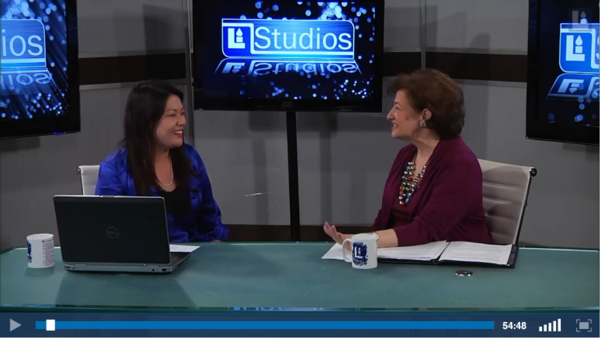
Elizabeth McCullough
April 25, 2016
What I learned at the TV Workshop
I confess that I wasn't too sure what I was getting myself into when I found myself in the front row of the Leadership Institute's monthly On-Camera TV training.All I knew was that if I'd known I would be on camera, I would have worn more makeup. Trying not to panic over my impending doom, I learned more about a few of my fellow students.As a busy mom, Christine Olson didn't have time to spend a day in the Studio. But then again, with an important TV interview looming, she knew couldn't afford not come. Despite having no hesitation speaking to large groups, her brain always froze in front of a camera.Even though it was Spring Break, Tristan Justice stayed in town for one of the limited seats in the highly sought after on-camera TV Training. As a college freshman, Tristan dedicates his time to conservatism activism and wants to be prepared as possible.That morning, at 8:50 am, conservative lawyer Aaron checked his email and saw there was an opening in the previously full TV training. “I had 20 minutes to rent a car.” He immediately drove 4 hours from New York City to the Sacher Multimedia Center in Arlington, VA and walked in right on time.You could feel the nervous energy in the air as guest faculty Beverly Hallberg smiled cheerfully behind the desk, almost as if the dreaded camera and microphone were her friends.Beverly has been on all sides of the camera. Producer, director, and host are just a few of the shoes she's filled. Before starting her own business, Beverly was also the Director of the Sacher Multimedia Center. Now she returns to teach uneasy yet eager students how to distil their message for TV.Under Beverly's encouraging instruction and honest feedback, I found myself thawing and even excited about my next turn in front of the camera.Everything she said mattered -- no filler information.Together we learned to ‘block' and ‘bridge' our message. As we fought through our camera fears, comradery and friendship replaced the jitters. The whole class cheered the next one to go ‘live.'By the end of the day, Christine was not only smiling at the camera but also at the top of the class.Aaron didn't dread the drive back to New York, “I knew it would be worth it -- and I wasn't disappointed.”My only regret was that it was over. And that I hadn't worn more makeup.Good thing the Leadership Institute hosts On-Camera TV Training every month -- I'll be in the front row again soon.>

Paul Van Remortel
April 19, 2016
Online Advocacy and Activism as a Tool for Action
In the digital era, videos that are really popular "go viral." This is true of online petitions as well - they spread quickly across social networks and a viral petition takes on a life of its own.For activists, this is a Godsend. Petitions have historically relied on word of mouth and community bonds to gain traction (and signatures). Today, it's easier than ever to rally thousands of individuals who share a given point of view and will show their support through signatures and sharing alike, substantially multiplying the impact.Unfortunately, the Left has dominated the medium through sites like Change.org, which has gathered more than 100 million users in support of primarily liberal causes. That success has fueled a myth that the tactic of online petitioning is one that only “progressives” can or want to use. But conservatives are increasingly realizing the benefits — and necessity — of incorporating online tools into modern activism efforts.Fortunately, anyone can become an effective advocate for any of the issues they care about with just a few simple steps.First, identify a cause you are passionate about — it doesn't have to be a national issue like Common Core or the Second Amendment. Sometimes the most powerful, effective petitions address local issues that others in your community care about as well.At StandUnited, an online platform we created to level the playing field for supporters of individual liberty, free enterprise, and limited government, individuals have created petitions that have had diverse impacts, from successfully requesting that Congress repeal the Medical Device Tax, to saving a historic Confederate War memorial in Portsmouth, Va.The next step is to identify the decision makers that will be able to effectively address the issue at hand. This could mean your local city council or the president of the United States — the beauty of digital activism is that anyone is easily accessible with your message.After identifying the decision makers for your issue, create and share a thoughtful, articulate petition with friends, family, neighbors and like-minded individuals. Nothing has made activism easier and more effective than social media, which is why it's so crucial that you share your petition on your social media profile to make sure as many people as possible see it. You might even be surprised by who agrees with you.Make sure that your local media is aware of your petition, and update them on the progress of the petition and the importance of your cause. This can be the most daunting part of the process, especially if you are not familiar with media outreach. Fortunately, most local media are interested in the issues that impact their city or state, and media coverage of your petition is one of the most effective ways to get the attention of decision makers.A great opportunity to get media coverage is to deliver your petition in person to the decision maker. If there is a deadline such as a vote, a hearing, or an election, use this opportunity to press the decision maker on your issue and get publicity.Finally, don't give up on your issue. Activism isn't a process that works immediately — sometimes it takes weeks or months for a petition to gain steam. Keep working to spread awareness of your petition and the issues at hand, and you're likely to see your hard work pay off.Thanks to the rise of digital activism, that sentiment is truer than it's ever been. Never have individual voices had a louder megaphone, higher platform or more direct access to decision makers, and as a result the power of the petition is greater than it's ever been. You have the power to make your voice heard.This piece was adapted from a recent Column on Townhall.com.Paul Van Remortel is the senior product manager at Intermarkets, Inc., a privately held digital media firm founded in 1997. Paul will be leading the “Online Advocacy and Activism as a Tool for Action” webinar hosted by the Leadership Institute on April 27. For a free registration visit https://www.leadershipinstitute.org/live/?ID=31958>
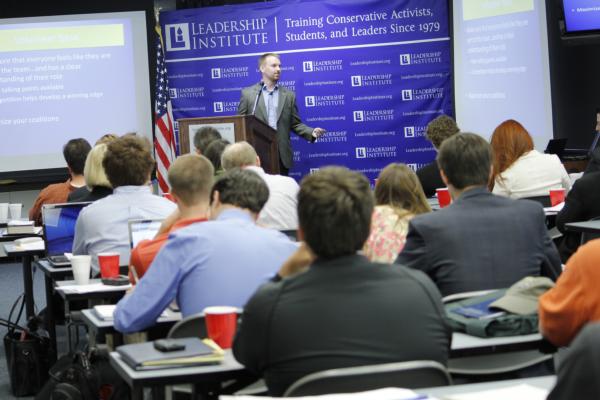
Morton Blackwell
April 8, 2016
Win America Back – through campaign powerhouses
“I got involved in politics because of Barack Obama's election,” said Matt Krause. “I have four kids. I didn't want to be the generation that didn't leave a better country to my children and grandchildren than those who came before me.” I can't tell you how many times I've heard conservatives tell me a story similar to Matt's. But I'm encouraged more Americans every day wake up to the danger our country faces and take action. Matt Krause took the Leadership Institute's Future Candidate School and won election to the Texas House of Representatives. As a donor, you empower my staff and me to train thousands of conservative candidates and activists like Matt and turn them into campaign powerhouses. Together, you and I – and the conservatives we train – advance our shared conservative principles to win America back. The training for conservatives – and the success – you make possible To win America back from the left, the Leadership Institute will hold numerous comprehensive training schools this year to equip campaigners and candidates for action. For campaigners, the Leadership Institute's Campaign Management School teaches them how to: Create a strategic campaign plan Build a grassroots organization of trained volunteers Plan a get-out-the-vote ground operation Mobilize voters to the polls Win the election “The Leadership Institute is a training ground for the conservative movement,” said Senator Ted Cruz. “In fact, one of the ‘secret weapons' in our upset Senate victory in 2012 was top notch volunteers and staff members trained by Morton Blackwell and the Leadership Institute.” LI does not support or oppose candidates, but once trained, Leadership Institute graduates become hot campaign commodities and work for conservative candidates of their choice at all levels of government – on races for city council all the way up to the White House. In LI's Future Candidate School, aspiring candidates learn how to: Assemble a network of loyal volunteers and campaign staff Get on the election ballot Develop a winning campaign message Handle hostile news media Connect with voters on a personal level Today, 32 Leadership Institute graduates are U.S. Senators and Representatives, 18 hold statewide offices, and 422 serve as state representatives. Leadership Institute graduates hold elective office in all 50 states – thanks to the training you provided them with your support. The Leadership Institute's new Campaign Academy builds on the trainings proved to create winning candidates. LI's Campaign Academy trains everyday Americans from Main Street America – business owners, teachers, doctors, pastors, and hard-working professionals. This new crop of principled conservative candidates, betrayed by establishment leaders, has stepped forward to fight the liberals themselves. Candidates in LI's Campaign Academy learn how to run for elective office and focus on how to build neighborhood teams of volunteers, connect with voters door-to-door and over the phone, research the electorate and opposition candidates, and prepare for media interviews. Everything is on the line in 2016 In the 2016 elections, the stakes are high. America will either continue down the road to socialism – on which there's a point of no return – or, conservatives will steer America back toward freedom and prosperity. With your help, I'm doing everything in my power to build campaign powerhouses to win America back. Since the 2014 elections, my staff has trained 554 conservatives in LI's Future Candidate and Campaign Management Schools, and another 8,201 trained in 256 political training schools. I have four Campaign Academies scheduled in battleground areas this year, with more to come. Let me end with an encouraging word from someone you trained – the second-youngest legislator in America. “The Leadership Institute gave me the tools I needed to beat an experienced liberal Democrat,” said 19-year-old New Hampshire state representative Yvonne Dean-Bailey. “Their training makes young leaders successful in organizing campaigns. I'm so thankful for the donors who helped LI train me to win.”
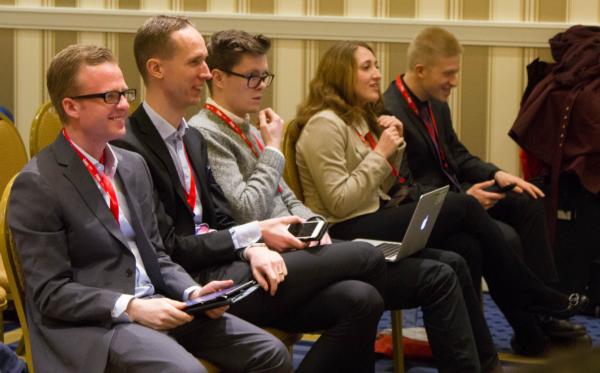
Natalie Tuttle
April 4, 2016
What You Missed at CPAC 2016
Each year, the Conservative Political Action Conference is a gathering of conservative leaders looking to network, advance conservativism, and learn from some of the greatest minds in the movement.This year, speakers like Dr. Ben Carson and Carly Fiorina rallied conservatives together. Above the stage read “Our time is NOW,” taken from Ronald Reagan's CPAC speech in 1981.At the conference, Leadership Institute sponsored, staffed, and organized of 5 conference events, including the job fair and boot camp training sessions.1. Activist Boot CampOn day one, the Leadership Institute partnered with the American Conservative Union and with American Majority to train 383 conservatives. Attendees were trained in student activism, community activism, and campaign technology.The Leadership Institute's Steve Sutton, David Blair, and Summer Ratcliff were among the boot camp faculty. Speakers from American Majority, Americans for Prosperity, FIRE, the Blaze, and the Franklin Center also trained activists and conservative leaders.2. ConservativeJobs.com - Career ConsultationsAfter the official CPAC kickoff on Thursday, Leadership Institute's Conservative Jobs organized recruiters from LI and other conservative organizations to critique CPAC attendee's resumes and offer one-on-one career consultations. Recruiters from LI, Cato, The Heritage Foundation, the Charles Koch Institute, and Americans for Prosperity sat down with 133 conservatives.3. CPAC Jobs and Internship FairOnce again this year, the Leadership Institute organized the CPAC Job and Internship Fair. Over 250 job seekers connected with 40 conservative employers.Organizations who recruited at the fair included grassroots organizations, media groups, think tanks, and policy foundations. Groups like Turning Point USA and Americans for Prosperity recruited field representatives while organizations like Townhall Media, Red Alert Politics, and Campus Reform looked for writers to hire.4. Campus ReformIn the exhibit hall, referred to by conference attendees as “the Hub,” Leadership's Institute's Campus Reform held an on-camera contest for students. Entrants were asked questions about issues on “live” camera by LI staff and competed for cash prizes.More than 100 students participated in the competition over the course of three days. All participants are eligible to be selected as Campus Correspondents, which will increase the number of conservative students exposing liberal bias on college campuses around the country.5. Young Activists Happy HourDuring CPAC, young activists from around the country network with each other. Swapping stories, discussing recruitment strategies, and just socializing with like-minded individuals are just a few highlights of the CPAC experience.To encourage networking among young conservative leaders, the Leadership Institute and seven other organizations hosted a Young Activist Happy Hour. Almost 400 attendees packed the bar and formed a line to the end of the block to spend the evening networking. Recruiters and staff of organizations like Young Americans for Liberty, Future Female Leaders, and the Charles Koch Institute mingled with activists.At the Happy Hour, the Leadership Institute welcomed many new activists to the Campus Leadership Program network. Almost aEvery year, CPAC is a new experience. Conservatives from all over the country (and from around the world) come together for a week of idea sharing, activist training, and coalition building. This year was no exception. With hundreds of new conservatives plugged in, trained, and employed conservative principles have a stronger voice going into election season.The Leadership Institute offers over 47 types of training programs, working with more than 1,759 conservative student groups, and helping employers connect with conservative jobseekers. Since the Institute's 1979 founding, LI has trained more than 172,000 conservative activists, students, and leaders. Graduates include members of Congress, state legislators, local officials, media personalities, and conservative organization leaders. For more information, please visit: www.LeadershipInstitute.org. >
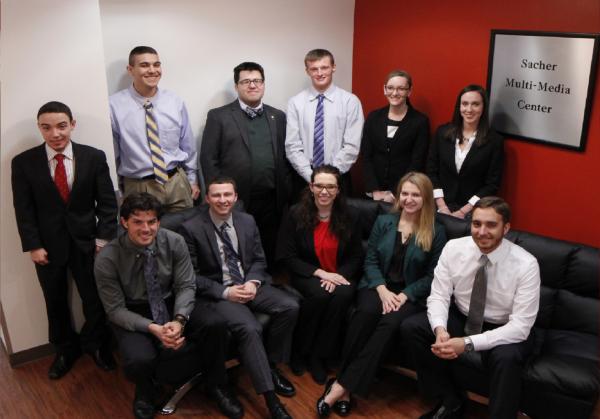
Derek Faraldo
March 31, 2016
The Conservative Internship Search: Capitol Hill vs. Non-profits
As a recent graduate of Georgetown University, I was blessed to have four years in the city of limitless internships, Washington D.C. However, not all students are lucky enough to attend college in the nation's capital. Fortunately, many universities have semester-long exchange programs, externships, or summer opportunities. During my undergraduate years, I participated in two non-profit internships and three congressional internships. If you do not have a few years to shop around for an internship then my experiences may help you narrow your search.Capitol HillI believe that in order to fully appreciate your time in Washington D.C. every intern should spend at least 12 weeks interning for a congressional or senate office.A congressional or senate internship can be a great resume booster, teach you some professional skills, and help you network on the Hill. Most interns are given simple office tasks to complete. While the work usually isn't anything inspiring, the experience of living in D.C. makes up for the sometimes boring days in a government office.For most prospective interns, there are some practical limitations. For example, in the year and a half I spent working for three different offices I did not get paid.If I had not had school housing, I would have been out of luck. There are some programs to help students pay for the cost of living in D.C, but it is an expensive city for a student on a budget.Non-profitsNon-profit internships are great starting points for careers in public policy, digital media, journalism, and many other fields. Each non-profit is different in office culture and atmosphere, but they generally operate in similar manners.For students or recent graduates who require monetary compensation and would like an internship with a job title and specific duties, the non-profit world is often a better option. In the conservative non-profit world, there are many paid internships that provide unique benefits.Often, these organizations hire from their own intern pool, so there is added incentive to make connections and maximize your efforts. The office environments vary, but at least you don't have to go through security every day!Most non-profits allow and encourage interns to work on projects that have value and many organizations treat interns like a staff member.A potential intern should really consider the kind of experience they want and set goals, always keeping in mind their practical limitations.Reflecting on my experiences, I would encourage students or graduates who lean conservative to seriously consider non-profit internships. Don't' worry, even while working at a non-profit, if you really want to see the Capitol building, you can visit your congressmen's office on your lunch break! One of his or her interns will give you a tour.Derek Faraldo is the current Grassroots and International Programs intern at the Leadership Institute. He recently graduated from Georgetown and will be working with Teach for America in the fall. Learn more about the LI Intern Program here.>
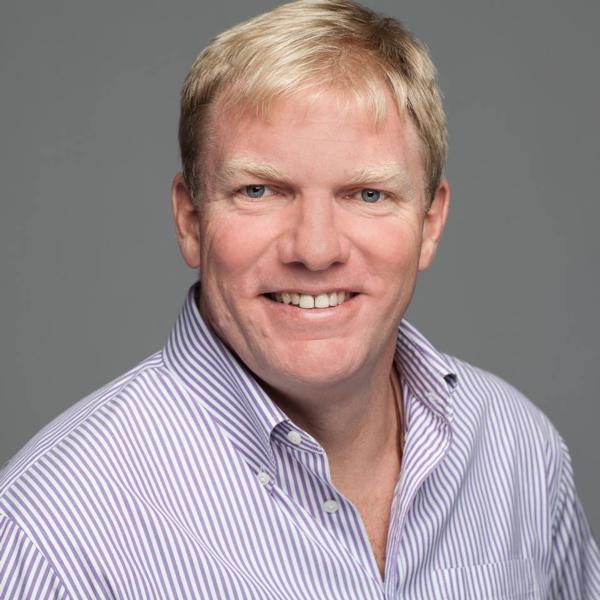
Natalie Tuttle
March 14, 2016
A Different Type of Activist
What do you think of when someone says that they're an activist? Do you picture scenes like supporters sign waving at the annual March for Life? Do you remember watching demonstrators on the steps of the Supreme Court waiting for a controversial decision? Meet Jason Jones. Jason is a conservative, pro-life activist who uses filmmaking to spread his message. His goal is to navigate through (and counter) morally challenged Hollywood. Known for films that promote a humane society, Jason is the president and founder of Movie to Movement, a project of his larger organization HERO (Human-Rights Education and Relief Organization). Through Movie to Movement, Jason targets a broad audience and tells stories that allow people to acknowledge the value of life at all stages. His films have won international attention for addressing tough issues that transcend generations and cultures. Published projects include the film Bella, winner of the People's Choice Award at the 2006 Toronto International Film Festival. When asked about the reception of conservative principles in the left-leaning film industry, he said, “I don't fish from a bucket [of conservatives]. I fish on the lake and put the fish I catch in the bucket.” Jason and his team offer an alternative to the cultural norms Hollywood accepts and encourages. Jason tailors every project to promote the value of humanity in Hollywood. Even in Hollywood, he finds support. “I don't believe any areas are shut off. Regardless of ideology, we agree on more than we think we do. Everyone want the best education, the best healthcare, the best world… we just have radically different ideas on how to get there.” Jason hopes that projects like Bella communicate with people on an emotional level. While each project has its own underlying focus, the mission of Movie to Movement is “to promote the incomparable dignity and beauty of the human person through the power of film.” Much of the work he has done, he has attributed to the Leadership Institute. Jason moved to the Washington DC area in the year 2000. He attended Institute workshops on fundraising, TV presence, and non-profit organization management. He read every book Morton Blackwell recommends in “Read to Lead” and went to as many Wednesday Wake-up Club Breakfasts as he could attend. Jason has adapted techniques employed by aspiring politicians for use in making and promoting films. For example, Jason transformed LI's precinct captain strategy into a “theater captain” program by assigning volunteers to advertise and advocate for Movie to Movement on the local level. This and other techniques learned in the classrooms at LI have helped Jason advocate for conservative principles in Hollywood. The Leadership Institute isn't just about learning techniques, it's about a network of conservative activists. While learning how to win at LI, Jason met his best friend. Jason has stayed in contact with many at LI, including Morton Blackwell. During his most recent visit to the Leadership Institute, Jason told staff members that because of LI, he knows how to do more than vote. Jason encourages everyone to take an active role in changing politics and culture. “If you think all you have to do is show up to vote, you're a D student,” he told the Leadership Institute interns. Jason champions party involvement and volunteering for causes and campaigns. To learn more about Jason and his project Movie to Movement visit www.movietomovement.com. The Leadership Institute thanks Jason for his dedication to conservative principles and congratulates him for receiving LI's Conservative Leader Award. To nominate a Leadership Institute graduate or faculty member for the Conservative Leader Award or Conservative Leader-In-Training Award, please contact LI's Director of External Affairs Carol Wehe, at Carol@LeadershipInstitute.org. The Leadership Institute offers over 47 types of training programs, working with more than 1,750 conservative student groups, and helping employers connect with conservative job seekers. Since the Institute's 1979 founding, LI has trained more than 172,000 conservative activists, students, and leaders. Graduates include members of Congress, state legislators, local officials, media personalities, and conservative organization leaders. For more information, please visit www.LeadershipInstitute.org.
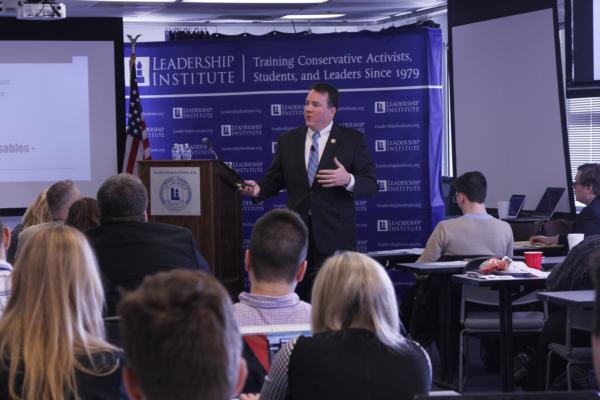
Natalie Tuttle
March 6, 2016
Future Candidate School: Training Conservatives to Win
If you knew the formula for winning, would you run for office?In January, thirty-four individuals attended the Leadership Institute's Future Candidate School. Some of them were declared candidates in their state or local races. Others were planning congressional runs and the remaining few had just begun to contemplate a run in the future.If you haven't considered running for office, you should. Running doesn't require thirty years of political experience or a few million dollar donors willing to sponsor you. With the right tools and training, anyone can learn to win at LI's Future Candidate School (FCS).For four days, attendees focus on building a base, raising funds, identifying voters, and recruiting volunteers. The faculty roster included political consultants, media coordinators, fundraising gurus, and even a current U.S. Congressman.The intensive training also focused on personal and political preparation for a career in elected office.Day 1: Are you ready to run?Because running for office means more than showing up to events with a smile and a wave, FCS started out with a session examining your ability to enter a race. George Landrith, president of Frontiers for Freedom, helped students examine their past and present, looking for signs of trouble. In the second session of the day, attendees learned that running for a higher office can be a full-time job with plenty of overtime and candidates have to be sure their finances are stable at home.To help candidates decide if running is right for them, Congressman Alex Mooney answered questions candidly about the role and responsibility of the candidate.The rest of the day focused on preparing your network and recruiting volunteers to your cause as well as making sure you have a positive media presence on the day you announce your candidacy.Day 2: So you decide to run. Now what?So now that our candidates have decided to run, they should develop a persuasive message. Leadership Institute Vice President of Development Steve Sutton worked through recent election messaging to demonstrate the impact proper use of messaging can have on a campaign. Nancy Bocskor reiterated the importance of messaging during her presentation on storytelling, emphasizing communicating effectively.In addition to crafting your message and sharing it with your voters, you also should reach out to existing groups and coalitions in your constituency. These coalitions may be able to provide volunteers and maybe even connect you with good candidates for campaign staff. Quality campaign staff do vital work to ensure your campaign is functioning efficiently and legally.Day 3: Getting in isn't even the hard part.Winning the race is the goal of every campaign, but what about staying in the race? You can't win the race if you can't pay your bills. Make sure you have the budget to remain a viable candidate.Competitive candidates have had to suspend their campaigns because they lacked the funds to keep the lights on. Don't be one of those candidates. Future Candidate School teaches candidates that their number one responsibility is fundraising. Staff and volunteers can get your name on the ballot and they can rally the voters, but only the candidate can raise money from donors. Day 4: Acting the part.On the final day of Future Candidate School, Dr. John Shosky, president of Roncalli Communications, Inc, spent the entire day with attendees, coaching each student through communication and messaging techniques. Beginning with introductions and ending with elevator speeches, students were led through a series of exercises to increase their confidence and improve their interpersonal skills. To be successful, candidates have to be versatile. Different situations call for different communication styles. Students were given tips on everything from posture to intonation. After drafting rough speeches, Dr. Shosky gave each student short critiques and advice to take away from the training. These guidelines are meant to improve the impression that a candidate will make in the first three seconds of meeting a potential volunteer, voter, or donor. Those thirty-four individuals walked away from the Leadership Institute's Future Candidate School with the formula to win. Will they run? Time will tell.To learn more about the Leadership Insititute or to sign up for a training go to LeadershipInstitute.org. >

Carol Wehe
February 26, 2016
CPAC 2016 Activism Boot Camp
American Majority and Leadership Institute are pleased to release the final agenda for the CPAC 2016 Activism Boot Camp, running Wednesday, March 2 – Friday, March 4, during the Conservative Political Action Conference in National Harbor, MD.On Wednesday, attend one of three tailored tracks—Student Activism, Community Activism, and Campaign, Data and Tech—as well as top-notch training sessions on Thursday and Friday. Note: The CPAC Activism Boot Camp is included in your regular CPAC 2016 conference pass. Wednesday Student Activism TrackWednesday, March 2, 2016, 1pm-5:30pm, (Chesapeake A-C)1:00 pm How We Reached 1 Million Students in 2015 (and How You Can, Too): Charlie Kirk, Turning Point USA1:45 pm “You Have to See This!”: Causing a Stir with Viral Videos: Caleb Bonham, DCO Consulting2:30 pm Changing Campus Culture: Summer Ratcliff and David Blair, The Leadership Institute3:15 pm There's No Such Thing as a Safe Space: Keeping Campuses Free: Catherine Sevcenko, Foundation for Individual Rights in Education4:00 pm Winning Student Elections: Scott Ellis and Micah Pearce, American Majority 4:45 pm Get Hired in Campaigns and Politics: Evan Stewart, Campaign Hunter5:30 pm Adjourn followed by Activism Boot Camp Reception, open to all Activism Boot Camp attendees Wednesday Community Activism TrackWednesday, March 2, 2016, 1pm-5:30pm, (Chesapeake D-F)1:00 pm Community Organizing in a Post-Obama World: Matt Robbins, American Majority 1:45 pm How to Beat the Left at Their Own Game: Brent Gardner, Americans for Prosperity2:30 pm The Latino Vote: The Beginning or the End of the Conservative Movement?: Mike Madrid, GrassrootsLab3:15 pm Social Media: How to Become the Digital Activist Every Movement Needs: Aubrey Blankenship, American Majority4:00 pm The Wisconsin Model: A Five-Year Fight: Matt Batzel, American Majority4:45 pm Not Running? What YOU Can Do to Influence an Election: Chris Doss, Revolutionary Communications5:30 pm Adjourn followed by Activism Boot Camp Reception, open to all Activism Boot Camp attendees Wednesday Campaign, Tech, and Data TrackWednesday, March 2, 2016, 1pm-5:30pm, (Chesapeake 4-6)1:00 pm Campaign Messaging: How to Come Across in a Me-First World: Jessie Nicholson, Wisconsin Women's Council Board Member1:45 pm Setting and Reaching the Right Vote Goals: Steve Sutton, The Leadership Institute2:30 pm What Is Political Database Technology and How Will It Help?: Chris Littleton, Voter Gravity3:15 pm Social Media, SEO, and Campaign Branding: Use It or Lose It: Austin James, SOLVE 4:00 pm Say Goodbye to Clipboards: How to Run a Campaign from Your Smartphone: Ned Ryun, American Majority4:45 pm Money Made Easy: Campaign Fundraising: Rachael Robertson, American Majority5:30 pm Adjourn followed by Activism Boot Camp Reception, open to all Activism Boot Camp attendees #CPAC 2016 Activism Boot CampThursday, March 3, 2016, 10am-4pm, (Chesapeake D-E)10:00 am Bridging the Divide Between Veterans and Politics: Seth Lynn, Veterans Campaign10:30am Talking to Minority Voters: Making the Case for Conservatives Nationally: Mike Madrid, GrassrootsLab11:00 am If Reagan Ran Today: What 2016 Activists Must Learn from Reagan's Leadership Style: Peggy Grande, The Quiggle Group11:30 am The Best Campaigns of Last Cycle and What You Can Learn from Them: Tayt Brooks, American Majority1:00 pm Become the Press: Oliver Darcy, The Blaze1:30 pm Grabbing the Spotlight: How to Generate Earned Media: Matthew Hurtt, Grassroots Leadership Academy2:00 pm Face-to-Face Still Matters: How to Win the Day with Personal Interaction: Matt Batzel, American Majority2:30 pm Reaching the Female Youth Vote: Alexandra Smith, College Republican National Committee3:00 pm Engaging Millennials: Whitney Neal, Bill of Rights Institute3:30 pm Know Your Enemy: Opposition Research: Alexandra Angel, America Rising PAC #CPAC 2016 Activism Boot CampFriday, March 4, 2016, 10am-1pm (Chesapeake D-E)10:00 am Conservative Talk Radio: Rational Thought and the Average Joe: Andrew Wilkow, Host of the Wilkow Majority on SiriusXM Patriot10:30 am Heat and Light: Making Government Accountable and Transparent: Josh Mandel, Ohio State Treasurer11:00 am How to Get-Out-the-Vote with Digital: Kurt Bardella, 0ptimus / Endeavor Strategies11:30 am You Get What You Measure: 10 Ways to Evaluate Your Lawmaker: Jessica Anderson, Heritage Action12:00 pm How to Win the Room: Public Speaking Success: John Tsarpalas, Commonwealthy.com 12:30 pm The New Journalism: Citizen Journalists: Kevin Glass, Franklin Center>
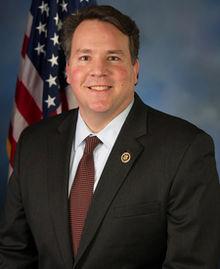
Cameron Douglas
February 25, 2016
Candidate to Congressman: Rep. Alex Mooney shares his story at Future Candidate School
As an intern at the Leadership Institute and a recent college graduate, I attended LI's Future Candidate School. Though it isn't something I know much about, the thought of running for office has crossed my mind and I want to take advantage of the opportunity to learn more. One of the best parts of the internship is the access to training programs staffed by outstanding faculty in relevant fields. During this Future Candidate School a member of Congress joined the list of expert faculty. Who better to lead a discussion on running for office than a sitting Member of Congress? Leadership Institute alumnus Congressman Alex Mooney (R-WV) came to LI's Future Candidate School to teach attendees how to successfully run for, and win, public office. Congressman Mooney's lecture drew on his extensive experience in campaigns at both the state and federal level. He won three elections to the Maryland State Senate, where he served from 1999 to 2011. Then, in 2014, he ran for and won a seat in the US House of Representatives in West Virginia. For me, Congressman Mooney's presentation was valuable in two big ways. First, he gave a frank, clear-eyed assessment of both the upsides and the downsides of running for office. Second, he provided a great deal of practical knowledge about how to campaign. Rep. Mooney emphasized the importance of fundraising for successful campaigning. He advised 80-90% of a candidate's time should be spent raising funds, which reflects Leadership Institute founder Morton Blackwell's saying, “You can't save the world if you can't pay the rent.” The Congressman also stressed the importance of having a clear, simple message, and taking that message directly to voters by picking up the phone and knocking on lots of doors. The part of Rep. Mooney's presentation which stayed with me most was not anything he said; rather, it was the way he presented himself to us. He's a sitting member of Congress, and none of the students at the school live in his district. Yet, he came out to share his experiences with us. To me, his candid yet friendly way of presenting himself was a prime example of the attitude a candidate for office should have while campaigning. To learn more about Leadership Institute training go to LeadershipInstitute.org/training and register to attend one or more trainings.

February 24, 2016
Digital Creative Workshop is on for tonight
The Digital Creative Workshop: Video, scheduled for this evening, is on for tonight. Attendees should be aware of inclement weather in the DC area.

Carol Wehe
February 15, 2016
The Leadership Institute is closed on Monday, February 15, 2016 for President's Day
The Leadership Institute is closed on Monday, February 15, 2016 for President's Day. You may leave a voicemail on LI's main line (703-247-2000) or send an email to individual LI staff. You will receive a response as soon as it is possible. The Leadership Institute is closed on Monday, January 25, 2016. January 25, 2016 | By The Leadership Institute is closed on Monday, January 25, 2016. The Written Communications Workshop scheduled for Monday and Tuesday evenings is also canceled. The Wednesday, January 27, 2016, Future Candidate School will be held as planned. Any changes or announcements for the Future Candidate School will be posted on this website. - See more at: http://www.leadershipinstitute.org/#sthash.b6AuAA4O.dpuf The Leadership Institute is closed on Monday, January 25, 2016. January 25, 2016 | By The Leadership Institute is closed on Monday, January 25, 2016. The Written Communications Workshop scheduled for Monday and Tuesday evenings is also canceled. The Wednesday, January 27, 2016, Future Candidate School will be held as planned. Any changes or announcements for the Future Candidate School will be posted on this website. - See more at: http://www.leadershipinstitute.org/#sthash.b6AuAA4O.dpuf

Natalie Tuttle
February 12, 2016
Regional Field Coordinator is Employee of the Quarter Award Recipient
The Leadership Institute recognizes an employee each quarter. This quarter's award recipient is Emily Larsen, who effectively works with several departments to spread conservatism across the country. Although her official title is Regional Field Coordinator, Emily has represented the Leadership Institute at student conferences and regularly coordinates with the Leadership Institute's Campus Reform team to expose liberal bias on college campuses. This past quarter, Emily managed Leadership Institute field representatives in Virginia, North Carolina, South Carolina, and New Mexico as they trained and managed over 180 conservative student groups in these states. In addition to her regular responsibilities, Emily promoted Campus Reform through articles, radio interviews, and television appearances. She has gone above and beyond to help Campus Reform uncover liberal abuse and biases on college campuses. “Even though this would be more than enough work to keep an average employee busy, Emily also volunteered to host several of LI's live webinars. I hereby recognize Emily Larsen as LI's Employee of the Quarter for the fourth quarter of 2015,” Leadership Institute founder and president Morton Blackwell announced at the January all staff meeting. “Please join me in a round of applause in appreciation for Emily's work.” After the applause subsided, Morton ended with, “Congratulations, Emily, for your outstanding job as team player and serving as a role model for all LI employees.” Emily Larsen is the Leadership Institute's Regional Field Coordinator for the Piedmont region, where she builds the conservative student movement on college campuses in the District of Columbia, Virginia, North Carolina, South Carolina, and New Mexico. Previously, she worked for LI as a Field Representative in Kentucky and West Virginia, and was an intern for the Campus Leadership Program. Before joining LI, Emily worked in the office of Mayor Richard J. Berry in Albuquerque, New Mexico, where she interned and acted as Boards and Commissions Liaison. She graduated from the University of New Mexico in 2014 with a B.A. in Political Science. In college, she led her Young Americans for Liberty chapter, interned for the New Mexico State Legislature, and volunteered for numerous campaigns.
.jpg)
Natalie Tuttle
January 29, 2016
Youth Leadership School Director Named 2015 Employee of the Year
Each year, the Leadership Institute recognizes one staff member for achievements that surpass all expectations. At the winter quaterly meeting, founder and president Morton Blackwell announced that the 2015 Employee of the Year is Youth Leadership School Director Daryl Ann Dunigan.In 2015, the Leadership Institute hosted 41 Youth Leadership Schools attended by 1,072 students from around the country and around the world."These impressive numbers set two new records for most students trained and the most of their particular school held in a single year,” Morton announced after the applause. The Youth Leadership School and Campus Leadership Program departments spent an average of three weekends a month training activists and student leaders, sometimes hosting two or three Youth Leadership Schools a weekend across the nation. Without dedicated leadership, this would not have been feasible. Daryl Ann and her team had an excellent year of recruiting and training.“These results would not have been possible without tireless work ethic and great leadership,” Morton said before giving Daryl Ann her award and a vase of flowers. Congratulations Daryl Ann!Daryl Ann Dunigan is currently the Youth Leadership School Director at the Leadership Institute, where she is responsible for identifying, recruiting, and training students across the nation.Prior to working for the Leadership Institute, Daryl Ann worked as Campaign Manager for Jeff Thompson's successful State Representative campaign in Louisiana. She was the Youth Coordinator for Congressman Andy Harris's campaign in 2010. She also was a summer intern with the Youth Leadership School department and John William Pope Civitas Institute.Daryl Ann graduated from the University of North Carolina at Chapel Hill with a B.A. in Political Science and Communication Studies. >
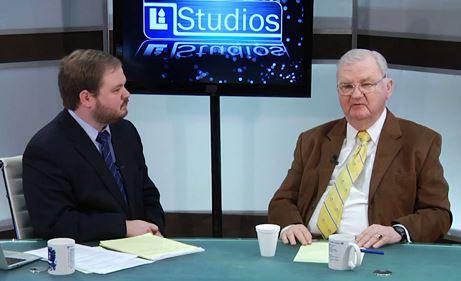
Natalie Tuttle
January 26, 2016
People, Parties, and Power: Live Webinar with Morton Blackwell
The first webinar of 2016 featured LI founder and president, Morton C. Blackwell. Morton began the lecture by sharing his experiences and knowledge of the party system, before detailing various roles conservatives can play in political parties. He called on conservatives to get involved. Whether you are a high school student looking to start a Teenage Republicans club or an adult willing to serve as a precinct committee man or woman, connect with your local party and get involved. Most campaigns and party committees have work left unfinished because they lack volunteers. Morton advised conservatives who want to get involved to go to a campaign or a committee and say, "I am here to help you. Tell me how I can help.” This attitude is welcome and this volunteer will be busy. Volunteers who are demanding or pushy can be relegated to a corner and are often forgotten. When working within a party, success is won carefully. In the discussion, Morton outlined ten points to keep in mind when working within a party. These tips for success can be found in Morton's writings. After explaining how individuals can influence political parties, Morton answered questions from the audience. Each response encouraged conservatives to connect with each other and stand by their principles. When asked about the differences within a party, Morton replied, “People seldom agree on everything. The way you put together a winning coalition is to organize groups that are nonpartisan that are active in the public policy process and use those groups to identify very large numbers of people who share a conservative viewpoint.” Together conservatives are stronger. Morton encourages cooperation of conservatives so that they can use their influence to change a party, even if not everyone agrees on everything. “We can't insist that everybody take actions for the same motivations that activate us,” he told the audience. For more on this topic be sure to watch the entire interview with Morton Blackwell online. Get involved, build coalitions, and influence the party.

January 25, 2016
The Leadership Institute is closed on Monday, January 25, 2016.
The Leadership Institute is closed on Monday, January 25, 2016. The Written Communications Workshop scheduled for Monday and Tuesday evenings is also canceled. The Wednesday, January 27, 2016, Future Candidate School will be held as planned. Any changes or announcements for the Future Candidate School will be posted on this website.
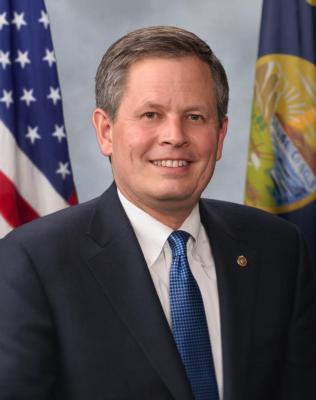
Thomas Bingham
January 18, 2016
The Next Wave in the Conservative Movement
In November 2014, Senator Steve Daines became the third Republican to hold a Senate seat in his state in a century. Winning by almost 18%, he became a Senator for Montana.Steve is a fifth generation Montanan who started his early political experience as one of the youngest delegates for the 1984 Republican National Convention. He was the president of College Republicans at Montana State University (MSU). After graduating from MSU with a B.A. in Chemical Engineering, he went on to work in the private sector for 28 years. In 2012, Steve won his election to the House of Representatives as Congressman for Montana, which has one at-large seat – and he quickly got to work.When asked about his experience in the House, Senator Daines explained, “I introduced bills that would address the challenges facing our nation and worked to move them through the committee process. Through these efforts, I was rated the most effective first-term Representative for the 113th Congress by GovTrack. Montanans sent me to Washington to be their voice and deliver results. I am committed to continuing to work hard for Montanans as I serve them in the Senate.”After an opportunity opened for conservatives to take the Senate, then-Congressman Daines decided to run. He faced some tough challenges in this race, but he knew how to activate his grassroots supporters.There's a new wave of support for the conservative movement. “Across the country, we are seeing Americans united behind traditional conservative ideals, such as reining in the federal government, protecting Americans from threats both abroad and here at home, and creating more good-paying jobs," said Senator Daines. "We must remain strong in our beliefs and work to effectively communicate how conservative solutions will get our nation back on track and promote economic opportunity.” Senator Daines' campaign shows conservatives can win when they have the right message and know how to activate their grassroots supporters. Senator Daines learned how to activate his supporters after he took the Grassroots Campaign Workshop in Bozeman, Montana. “I'm thankful for the work that the Leadership Institute does to further conservative ideals that have shaped the future our nation for future generations,” he said.The Grassroots Training Workshop teaches conservatives effective grassroots and campaigning organizing. Attendees learn how to get involved, drive support for an issue or candidate, organize activists in large or small groups for maximum impact, communicate more effectively, use the media to help advance an issue, and build personal leadership skills, abilities and confidence. The Leadership Institute thanks Senator Daines for his dedication to conservative principles and congratulates him for receiving LI's Conservative Leader Award. To nominate a Leadership Institute graduate or faculty member for the Conservative Leader Award or Conservative Leader-In-Training Award, please contact LI's Director of External Affairs Carol Wehe, at Carol@LeadershipInstitute.org. The Leadership Institute offers over 44 types of training programs, working with more than 1,761 conservative student groups, and helping employers connect with conservative jobseekers. Since the Institute's 1979 founding, LI has trained more than 170,266 conservative activists, students, and leaders. Graduates include members of Congress, state legislators, local officials, media personalities, and conservative organization leaders. For more information, please visit: www.LeadershipInstitute.org.>
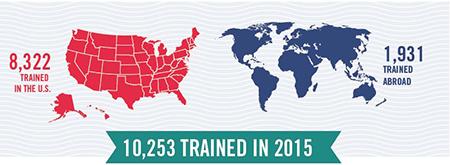
Kyle Baccei
January 12, 2016
2015 Accomplishments
Another exciting year for the Leadership Institute is on the books! In 2015, the Institute trained more than 10,000 conservatives, set new records in the Campus Leadership Program, and expanded its career services -- all thanks to the generous support of LI donors.LI's staff and 320 volunteer faculty trained 10,253 students -- totaling 102,058 hours of student training. The Institute trained 8,322 students nationally and 1,931 students internationally, bringing the total trained to 171,185 since 1979.In total, LI offered 283 training events representing 42 types of Institute trainings. These ranged from on-camera TV trainings to week-long Campaign Management Schools to grassroots activist workshops to the Youth Leadership School, the boot-camp of politics.The Institute also launched a new type of training: Campaign Academies. These intensive academies combine five weekends of in-person training with online seminars so candidates and campaign staff learn how to win races for elected office. On college campuses around the country, LI's National Field Program staff identified 53,986 new conservative students and added 491 new student groups to LI's unique network of affiliated conservative student organizations. By the end of 2015, this network of conservative student groups had grown to 1,732 -- an all-time high.The Youth Leadership School set a new record. In 2015, 1,072 conservatives attended 41 trainings -- the most students trained at a Youth Leadership School in a single year.CampusReform.org remains America's #1 source for campus news online. Its 886 stories – many written by 60 campus correspondents – about liberal bias and abuse generated 11.5 million pageviews. In total, CampusReform.org's reporting led to 26 victories for conservatives on college campuses, 15 hits on the Drudge Report, and 101 appearances on TV. More than 2,585 job seekers connected with 2,195 available jobs on the Institute's ConservativeJobs.com. The Career Services Center hosted 569 attendees at job fairs and offered 271 hours of personal career mentoring. Viewers from all 50 United States and around the world have tuned in to LI's free webinars since they began streaming from LI Studios in 2011. In 2015 alone, 1,845 viewers watched LI's 22 webinars.LI's Wednesday Wake-up Club Breakfasts hosted 1,067 attendees and 12 speakers in 2015. Speakers included Right to Work President Mark Mix, Congressman Jim Jordan, and Congresswoman Barbara Comstock.The 44th National Fourth of July Conservative Soiree hosted 645 attendees. This year's featured speaker was Martha Boneta, a Virginia farmer, conservative activist, and LI graduate.It's been a good year at the Leadership Institute, and LI is excited about what 2016 has in store!How has LI helped you? Email Carol@LeadershipInstitute.org to share your story. LI is always looking to spotlight faculty doing incredible things for the conservative movement, notable LI graduates making waves, and college students taking a stand on campus.>
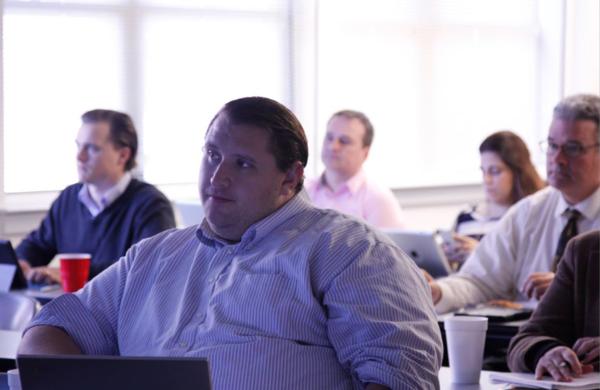
Angel Chitnatham
December 14, 2015
Hoosiers take on a Race for Congress
Even campaigners with years of experience can stand to learn from the Leadership Institute. Earlier this month, Jadan Horyn participated in the Leadership Institute's Campaign Management School and came away with enough knowledge to give an edge to his congressional campaign. Jadan is currently the campaign manager for Jim Pfaff, a candidate running in Indiana's 9th Congressional District. “It all started when I was 13 years old,” said Jadan. “During the Bush/Gore 2000 election, I stayed up all night to watch election results. Pretty much from then on, I was fully enveloped in politics.” A 2012 graduate of Liberty University, Jadan dedicated years to build up his College Republicans group; work with the State Central Committee, the governing body of the Republican Party of Virginia; and serve on the College Republican state board. Jadan would go on to co-host his own talk show called “Rude Awakening” at Liberty University, hosting guests like Senator John McCain and Governor Mike Huckabee. After graduating, Jadan integrated his media background and his interest in political campaigns working for Laura Ingraham on her FOX News appearances, followed by three years of working in congressional communications. It wasn't until he started working in Congressman Tim Huelskamp's office did he meet Jim Pfaff, then Chief of Staff for Congressman Huelskamp. Jim Pfaff would then ask Jadan to be his campaign manager in his race for congress in his home state of Indiana. “I told him I'd take the job but that I needed to go to LI to fill in the missing pieces.” said Jadan. The week-long Campaign Management School provides the students with a run-through on the know-how and tools required to establish and build up their campaigns. “First day, we learned opposition research. It was the how, the methodology, was what I didn't know.” On the first day at the training, Jadan texted his staff how and where to look for the potential weaknesses of their opponent. “By 4:00 p.m. that day, I had an entire document from my campaign researcher about questionable votes made by our opponent. If I had never come to this training, I would have never had that ammunition to use on them.” When asked what advice he would give future candidates and campaign managers now that he's completed the Campaign Management School, he said “Sit them down and hold them accountable….and make sure they follow through on their goals.” Join the Leadership Institute in thanking Jadan for his dedication to conservative principles and congratulate him for receiving LI's Conservative Leader-In-Training Award. To nominate a Leadership Institute graduate or faculty member for the Conservative Leader Award or Conservative Leader-In-Training Award, please contact LI's Director of External Affairs Carol Wehe, at Carol@LeadershipInstitute.org. The Leadership Institute offers over 44 types of training programs, working with more than 1,761 conservative student groups, and helping employers connect with conservative jobseekers. Since the Institute's 1979 founding, LI has trained more than 170,266 conservative activists, students, and leaders. Graduates include members of Congress, state legislators, local officials, media personalities, and conservative organization leaders. For more information, please visit: www.LeadershipInstitute.org.
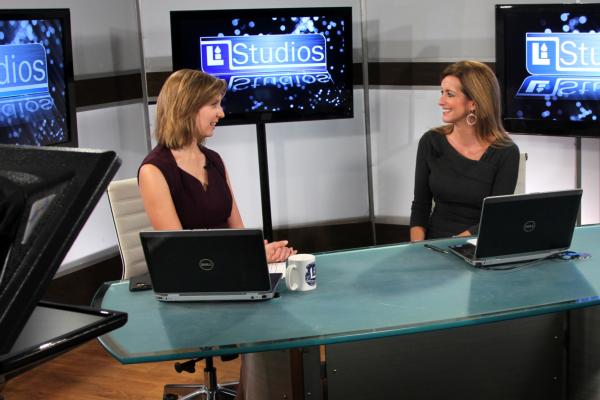
Kyle Baccei
November 24, 2015
The Science of Fascination
Last Wednesday the Leadership Institute hosted its biweekly webinar and the topic was fascinating. Peggy Grande visited LI studios to discuss the science of fascination during the free live webinar Lead, Live, and Be Fascinating.Peggy had the opportunity to work with one of the most fascinating individuals in history -- Ronald Reagan. She began the webinar discussing how her work with Reagan shaped her perspective on the science of fascination. What made him uniquely fascinating and why are we still analyzing his life and leadership? What can we learn from his life that we can apply to our own?Peggy answered these questions and offered insight into this iconic leader. She told us about the secrets to his effectiveness. How the life and presidency of Ronald Reagan can guide you and I toward greater personal success and shapes us professionally to be our best self.President Reagan was truly a fascinating man, and the lessons you and I can learn from his unique personality certainly make us better people.But still, I wondered, what makes me the most fascinating person? Sure, Ronald Reagan was fascinating and how he used his natural qualities to his advantage was great. But, how do I do this? What makes me different and how do they make me the most valuable to others? Peggy had the answer. Whether you are looking for a new job, moving up in your current career, or changing careers, it is essential to know how you uniquelyadd value. Trying to be “better” or “more” rarely works because it is subjective and constantly changing. Instead, she suggests you find out what makes you different and then you should become more of that. This was truly a fascinating webinar. Learning what makes each of us different, and then using that as an advantage, makes us unique in the work place. To hear Peggy talk about the science of fascination click here. It will be fascinating, I promise.For more information on webinars email Carol@LeadershipInstitute, or check out LI's training calendar to find the next live webinar.The Leadership Institute offers over 44 types of training programs, working with more than 1,582 conservative student groups, and helping employers connect with conservative jobseekers. Since the Institute's 1979 founding, LI has trained more than 170,116 conservative activists, students, and leaders. Graduates include members of Congress, state legislators, local officials, media personalities, and conservative organization leaders. For more information, please visit: www.LeadershipInstitute.org.>
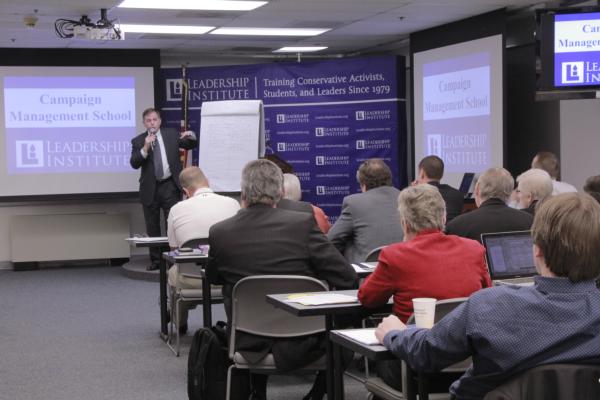
Thomas Bingham and Angel Chitnatham
November 19, 2015
Launch into 2016 as a Campaign Manager
This has been another good year for conservatives who took Leadership Institute (LI) training. In 2015 alone, 161 conservative activists took a Campaign Management School. These graduates are people looking to get involved in their community. They want to be leaders and make changes to their cities, counties, and states by winning elections -- for conservative principles.After hours of lectures, these graduates left with the ability to organize a campaign -- from the moment the campaign begins to Election Day. Better yet, LI grads learned what they have to do from day one to win and affect the public policy process.“I will be forever grateful for the knowledge and specialized training I have received at the Leadership Institute. LI is at the forefront of the current conservative revolution and I am proud to be a part of it,” said Florida resident James White, a recent Campaign Management School graduate.Tori Whiting of Michigan said the March training was “a great way to get conclusive and in-depth training on campaigning.” Ron Ferguson of Ohio said his June participation in LI's Campaign Management School was “the launching pad to being prepared for a campaign."These graduates understand in order to win being trained by the experts is the key to success. But 2015 isn't over yet. There is one last chance to attend a Campaign Management school in 2015.There is still time to join these graduates and get prepared for your next campaign.Mistakes happen, but Leadership Institute graduates know how to respond because they have training. They know how to have an effective strategy. The Campaign Management School teaches just that. And regardless of your political experience, the expert faculty will get you ready for day one of your next campaign.Each training day brings on a new lesson plan that will equip you with the basics to achieve success.Day 1: “Develop a winning campaign plan and strategy”Day 2: “Target and identify your voters effectively”Day 3: “Learn how to raise funds for your cause” Day 4: “Develop effective ads and protect your candidate's image”Join LI next month at the Campaign Management School, December 1st through December 4th and learn how to run your own campaign big or small. End the 2015 season with some inspiration and the know-how to take your race to the next level.Email Angel at AChitnatham@Leadeshipinstitute.org for more information on the training or register for the December Campaign Management School here.The Leadership Institute offers over 44 types of training programs, working with more than 1,582 conservative student groups, and helping employers connect with conservative jobseekers. Since the Institute's 1979 founding, LI has trained more than 165,206 conservative activists, students, and leaders. Graduates include members of Congress, state legislators, local officials, media personalities, and conservative organization leaders. For more information, please visit: www.LeadershipInstitute.org.>